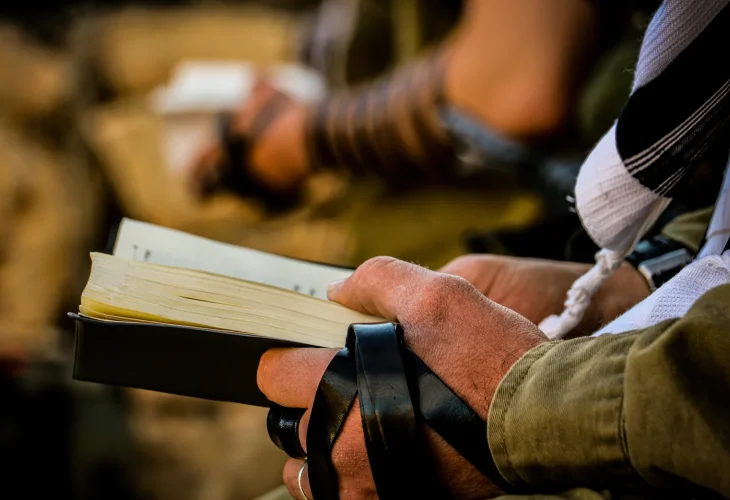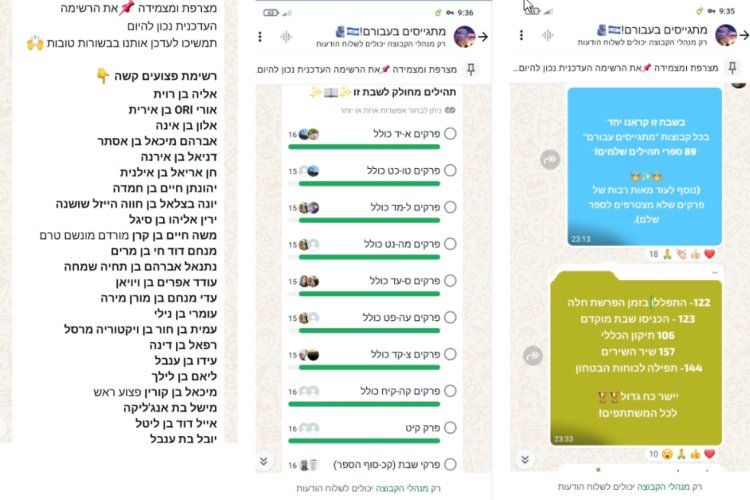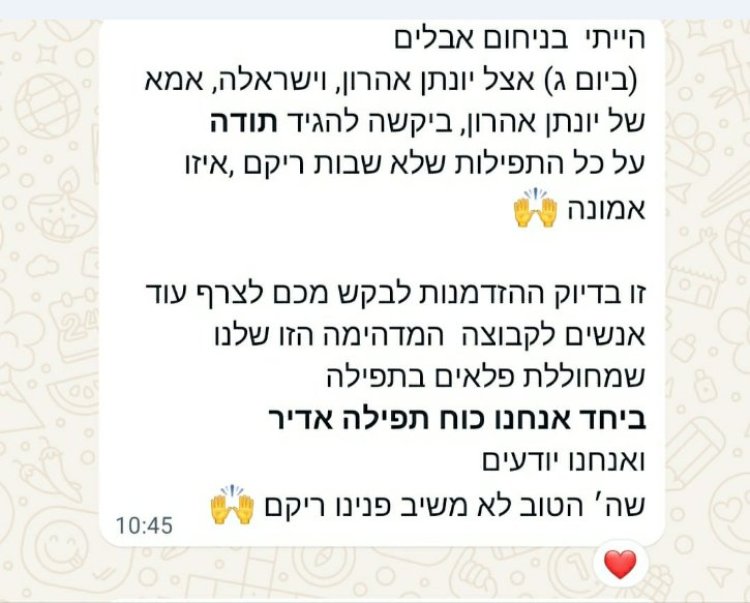How a WhatsApp Prayer Group Became a Global Movement
When Moriah started a WhatsApp group to pray for wounded soldiers, she couldn't have imagined the scope it would reach: "People overseas are praying and thanking us."
 (Photo: Shutterstock)
(Photo: Shutterstock)"We're happy to share that Shilah's surgery was successful, and we thank those who prayed for him"; "Itamar ben Rita Rivka, unfortunately, has returned to the critical list - sedated and on a ventilator. Please continue to pray for him"; "Elkana ben Miriam Rina is scheduled for surgery today. Please pray for a successful outcome." Messages like these have passed through Moriah's hands, the leader of the WhatsApp group "Rallying for Them," dedicated to praying for the wounded soldiers. She prefers not to disclose her full name, as does the leadership of other similar groups I contacted. One of them, a well-known figure, refused even an interview. "I prefer to remain anonymous," she said to me. Meanwhile, another message was sent to the group: "Nataniel ben Sima Chaya has come out of surgery; we felt the prayers."

Blanketing with Prayers
When the war began, Moriah searched for a way to help. "I couldn't go to the front, but I could contribute in this way," she says. "Initially, I received a list of around 350 wounded people. However, I realized it wouldn't be feasible to pray for all of them each day. After some thought, I decided to cycle through the names over 40 days. Each day, 20-30 names are circulated for prayer. The names of those critically wounded are in the group's description, so they're always accessible for prayer. If we have their pictures, we share those as well. Seeing faces helps remember their names."
Within days, the initiative gained momentum and grew. "We went from 200 to 4,000 warm-hearted Jews who envelop our wounded in daily prayers," Moriah says excitedly. "From there, more volunteers joined. Penina decided to translate the names and create a group for English speakers. Ywan, Nathaniel, and Isabelle took the task of publishing the names in French. Another volunteer joined the group to help with updates, and a new group called 'Prayers for Their Return' was created for the hostages under a worthy volunteer's lead."
Updates are rare in the hostage group, but there's a lot of thought and sensitivity behind the names. "When we divided the hostages' names into a 40-day cycle, we wondered what to do if one was released during the period. We decided that prayers would still be needed for them to heal physically and mentally, so they remain in our prayers for a few more weeks."
The prayer group for the wounded, on the other hand, is lively with updates. "We constantly try to update on the wounded's conditions - through messages, pictures, and videos sent by acquaintances and family members. There are many messages like 'We feel the prayers surrounding Shmuel ben Bat Sheva. He's transitioned to rehabilitation at Beit Levinstein'; 'A miracle! Abraham Yosef critically injured - woke up, removed his own breathing tube, and began speaking to those around him.' Sometimes stories get published in the media, and we share them with the group. Recently, we shared an image with a soldier in a full body cast in one half, and smiling in recovery in the other. Our prayers have played a role in these miraculous moments, and witnessing them gives us strength to keep praying. It allows us to exhale and find joy in a challenging reality."
The soldiers' stories keep arriving. "Personally, I was very moved by the story of a soldier whose lungs were severely damaged, and we all hoped for his improvement. Shortly after, we heard that Dor Zimel, may he rest in peace, was killed, and his lungs were donated to that soldier. It's a painful yet joyful reality, an immense example of mutual responsibility. Another soldier was evacuated from the Gaza Strip to the hospital while receiving assistance from the paramedic beside him. A few months later, we received a picture from the paramedic's wedding, with the soldier lifting him on his shoulders. Again, this mutuality and togetherness. I am also touched by images of wounded soldiers with their newborns, as this continuity of generations holds eternal power."
Who Keeps the Wounded List Updated?
"There's one main person who shoulders the burden, striving to connect and verify the wounded's names and their conditions. Other women participate, but less frequently. This information is gathered through the broader circles around the wounded - uncles, neighbors, and friends. Every week or two, an updated list is shared globally."
Globally?
"Indeed, we are one unified group. These groups' reach has spread far and touches many Jews overseas. Though they are oceans away, they want so badly to be a part and connected to what's happening in Israel. The opportunity to pray for the wounded allows them to maintain this connection and contribute to the effort. We receive many messages full of gratitude; people tell us that these prayers connect and invigorate them. At the same time, we keep the wounded's family updated on all the prayers being said, sending them warm embraces from the Jewish people. The families deeply appreciate and cherish this support. This mutual responsibility is truly moving."

More Initiatives Spring Up
But the initiatives didn't stop there. "A few weeks ago, one of the group's women went to visit soldiers at Sheba Hospital," Moriah shares. "A soldier she supported a bit more invited her to a thanksgiving party after his recovery. She shared a photo with the soldier, and it stirred a commotion. People reached out, wanting to visit soldiers too but finding it challenging alone. Thus, another group began, organizing small groups for hospital visits. The woman, who became the group leader, posts a specific day and time, creating a private subgroup for those who wish to participate. They organize what to bring - one brings flowers, another cake, each according to their heart's desire, and together they come to cheer the soldiers lying in the wards. The visit also serves as a thank you to the soldiers for what they have done for us, and we make sure to appreciate the medical staff who work tirelessly for the wounded. Visits on Fridays are particularly important since some soldiers go home, and it's crucial to encourage those who stay. Today, the group has about 500 participants, and this shared effort helps them step out and visit."
Another initiative took on a slightly different character. "At the war's start, I read a text someone wrote about the importance of building a Jewish home, noting that it's not just a personal matter but a national one that strengthens the entire Jewish people. After so many families have been shattered, every new family built is a rebuilding of Jerusalem's ruins. I thought the people in the prayer group are caring people and would likely be happy to help others find matches. Thus, a matchmaking group was formed. After my screening process, names and details of potential matches are shared, trying to move them towards marriage. About 75% of the group's participants said they used the information; it seems we're on the right track."
Full Circle
Concluding the conversation with Moriah, I turned to Talia, who handles updating the wounded lists. "Two years before the war, we started a group to pray for Nadav Weinberg, who was wounded in an attack in the City of David," she recounts. "People prayed, set aside challah, what not, and thank Hashem, he recovered and got married. This group continued circulating names for prayer, and as soon as the conflict started, it was flooded with new names. Constant messages about the wounded come to me and other women. People from all ages and sectors reach out. This led me to manage the wounded lists, detailing each one's condition and sharing them with the public. I've always loved to give and volunteer; stepping into this role was natural for me."
Over time, new initiatives emerged here too. "At some point, Esther ben David, who runs an organization assisting terror widows, reached out for help. I assist her a bit with fundraising for specific needs widows request. Sometimes they need babysitters, help at home, or a break, but financial constraints make it hard. People think war widows are financially secure, but often there's much bureaucracy, and receiving funds takes time. Besides, these women have suffered greatly, so their needs can be higher than an average woman's. I try to help there as much as possible too."

